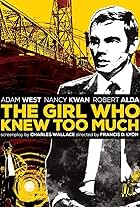The early seventies were a time of great introspection for many people. Not surprising, given the college riots, Vietnam, revolutions, sexual and otherwise, that the country began to question everything they knew. This was reflected in a vast of Pictures that ranged from Antonioni's "Zabriskie Point", Stephanie Rothman's "The Student Nurses", to Haskell Wexler's "Medium Cool". It was an era wherein films were chic to be socially relevant. Many of those films, such as the above stated, are still relevant today. Others tried, and while they were admirable attempts, they just didn't have enough to sustain themselves. Louis Garfinkle's "Beautiful People" is one such film.
Garfinkle would later go on to a small feat of glory for penning the story to Cimino's compelling story of the damaging effects of the Vietnam war, "The Deer Hunter", but before, he participated in a string of other forgotten features, starting with writing and directing this one (of which remained the only film he ever directed). Interestingly acting as a somewhat precursor to his latter success, "Beautiful People" concerns itself with a Psychiatrist, liberated and open minded, who takes eight volunteers to a secluded ranch to conduct an experimental workshop with/on them, intending to cure them of their social hang-ups, issues, resentments, and other problems they have with each other and with themselves. From here, a variety of characters are introduced, that range from a sexually frustrated policeman, an overly zealous sexual hippie chick, a cold and aloof rich woman, a resentful African American women, a gay man who dresses in drag, and an obese man who simultaneously is socially awkward, among others. The experiments and practices of the workshop are not your Mother's standard, and as the characters go through them, they unravel and come to terms with themselves and learn to accept each other.
The results of the characters are varied, and if one ever gets a chance to view this picture, it comes off as unintentionally funny, not so much because the writing is bad, but because Garfinkle is trying every gimmick he can to take the film seriously that the question of it's validity surfaces without a thought. Garfinkle certainly has his mind on the matter, but is very amateur on how to execute his own material. In the end of the movie, there is a definite wanting to have enjoyed it, and to recommend it, but it just falls so flat that it's easily swept away with other forgotten movies of that cultural era. Only the strong survived.
It certainly didn't help that, with the release of William Friedkin's "The Exorcist", some smaller company erroneously filmed an egregious prologue and epilogue depicting the devil (nee: a man in REALLY bad make-up) commenting to the audience that these people of the story are his victims and therefore attempts to change the tone of the picture to a more "edgy" feel. Title now lists the film as "The Sexorcists". It's laughable and doesn't work, and is clearly not meant to be part of the original film. This may very well be the reason the film fell into obscurity way back when, and has ceased to surface on any home video format for any reason.
There is definitely an intellect to the film that would later be perfected upon in "Deer Hunter", but it's premature. Despite Garfinkle's best intentions, there isn't anything really beautiful about the people in the film: no structure, bad character development, cheesy musical montages, and hokey dialogue abound. It comes off more like a really bad student education film for high-schoolers (except for some nudity which appears at the end). And it's such an obscurity, that one should check it out if given the chance, for to a completest of cinema, there is definitely something to take from it.








